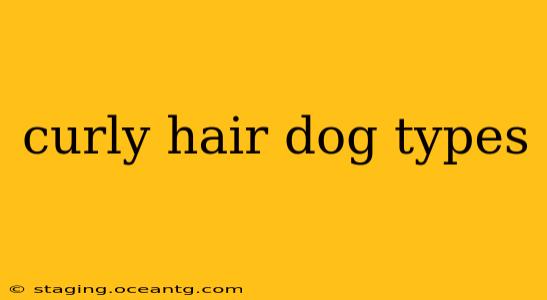Many dog lovers are drawn to the adorable fluffiness of curly-haired dogs. These breeds boast unique coats that range from tight curls to loose waves, adding to their charming personalities. But beyond the cuteness, understanding the specific needs of curly-haired dogs is crucial for responsible pet ownership. This guide delves into various breeds known for their curly coats, exploring their temperaments, grooming requirements, and health considerations.
What Dog Breeds Have Curly Hair?
Numerous breeds sport naturally curly coats. Some are well-known, while others remain less common. The degree of curliness can also vary significantly within a breed, influenced by genetics and environmental factors. Here are some popular examples:
-
Poodles (Standard, Miniature, Toy): Perhaps the most iconic curly-haired breed, Poodles are prized for their hypoallergenic coats, intelligence, and elegant appearance. Their curls range from tight and corded to looser waves, depending on the grooming style.
-
Bichon Frises: These small, white dogs are known for their fluffy, cotton-like coats. Their curls are generally softer and less tightly coiled than a Poodle's.
-
Lagotto Romagnolo: This Italian water dog boasts a unique, dense, curly coat that's incredibly water-resistant. Their coat requires regular grooming to prevent matting.
-
Portuguese Water Dog: As their name suggests, these dogs were originally bred to assist fishermen in Portugal. They have a wavy to curly coat that requires regular brushing and occasional professional grooming.
-
Kerry Blue Terrier: This Irish breed has a distinctive soft, wavy to curly coat that comes in shades of blue-gray. Their coat requires regular brushing and professional grooming to prevent matting.
Are Curly-Haired Dogs Hypoallergenic?
Do curly haired dogs shed less?
While no dog is truly 100% hypoallergenic, many curly-haired breeds, particularly Poodles and Bichon Frises, are often considered to be among the less allergenic options. This is because their curly coats shed less than many other breeds. The dander (dead skin cells), a primary allergen source for many, is less likely to become airborne. However, it’s crucial to remember that individual reactions to dog allergens vary, and even these breeds can trigger allergies in some individuals. Spending time with a dog before committing to ownership is always recommended for allergy sufferers.
How Often Should I Groom My Curly-Haired Dog?
How do I groom a curly haired dog?
Grooming requirements for curly-haired dogs vary greatly depending on the breed and the individual dog’s coat type. Generally, these breeds require regular brushing, at least several times a week, to prevent matting and tangles. Professional grooming is often recommended every 4-6 weeks, especially for longer, curlier coats. This involves bathing, trimming, and de-matting to maintain a healthy and comfortable coat. Neglecting grooming can lead to matting, skin problems, and discomfort for your pet.
What Health Problems Are Common in Curly-Haired Dogs?
What are the health issues of curly-haired dogs?
The health concerns of curly-haired dogs vary significantly depending on the breed. Some breeds, like Poodles, are generally healthy, while others may have breed-specific predispositions to certain conditions. For example, some breeds are prone to hip dysplasia, eye problems, or specific skin conditions. It’s essential to research the specific health concerns associated with the breed you are considering before adopting. Regular veterinary checkups are crucial to catch and manage any potential health issues early.
Choosing the Right Curly-Haired Dog for You
Selecting a curly-haired dog involves considering factors beyond just their adorable coat. Assess your lifestyle, living situation, and experience with dogs to ensure you can provide the breed's specific needs. Consider factors like grooming requirements, exercise needs, and potential health concerns to make an informed decision. Responsible pet ownership involves commitment, research, and a lifelong dedication to your furry friend's well-being.
